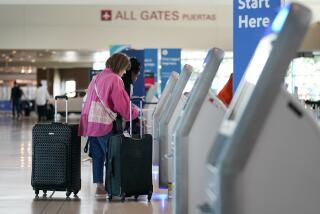After 10 Years, Jury Still Out on Deregulation : Airline Industry Beset by Safety Woes, Turmoil
- Share via
WASHINGTON — Ten years ago today, President Jimmy Carter signed the law that gave the country People Express, Supersavers, Frequent Flyers, Frank Lorenzo and the Flying Nosh.
The Airline Deregulation Act of 1978 paved the way for competition in the once-quiet airline industry, letting carriers rather than the government decide where they would fly and what they would charge for their tickets.
Few could have predicted then the upheaval that deregulation would cause as new airlines popped up like mushrooms in the moonlight and ticket prices plummeted in fare wars between established carriers and upstarts.
Even after a decade, the turmoil in the industry and the controversy surrounding deregulation has not died down.
The number of airlines in the country jumped more than three-fold from 36 in 1978 to a peak of 124 in 1984, while the number of passengers flying doubled from 243 million in 1977 to 486 million in 1987.
A shakeout period of bankruptcies and mergers saw the number of airlines drop to 74 last year.
People Express, the airline that carted knapsack-toting students back to college for peanuts, is gone and so is Air One, the fancy first-class-only airline for the champagne and truffles set.
Safety Concerns
Even giants such as Eastern and Pan American are tottering shadows of their past profitability.
With the financial squeeze, questions have arisen whether some airlines are sacrificing safety margins for profits, although the Federal Aviation Administration has proclaimed the airways safe, citing statistics that show accidents per passenger mile have remained steady since deregulation.
The Transportation Department, responding to safety concerns, this spring conducted an unprecedented monthlong inspection of Eastern and its sister, Continental Airlines, ultimately clearing them of allegations of widespread safety violations.
When a 19-year-old Aloha Airlines Boeing 737 ripped open in midair last spring, new concerns arose about the safety of older airplanes often used by small upstart carriers.
Again the FAA assured the public that properly maintained older aircraft are as safe as new aircraft, although it did issue an emergency order requiring inspections of older 737s.
But those inspections failed to detect a 12-inch crack found earlier this month during a repainting job on a Continental 737 in the same area of the plane where the Aloha jetliner tore open.
Doubts linger in the minds of many critics about the overall safety of the system, fueled in part by a surge in the number of near misses in recent years.
A major concern is the overcrowding of the nation’s airways because the pre-deregulation network of airports and air control facilities has not been able to handle the huge increase in the number of aircraft.
The FAA, after a startling number of errors by air traffic controllers, was forced to cut down on the number of landings permitted each hour at Chicago’s O’Hare International Airport earlier this month from a maximum to 96 to 80.
Crowded Skies
In addition to creating safety problems, the crowded skies have made delays the norm for travel to cities such as Chicago as more aircraft try to squeeze into the same amount of air and airport space.
For example, nearly half the flights arriving at O’Hare between 6 p.m. and 8 p.m. during August were late by more than 15 minutes, the Transportation Department reported.
In the middle of the turmoil, the bottom line is that 10 years after deregulation, there still is no consensus on whether it was a good idea.
John Robson, a former chairman of the Civil Aeronautics Board and a driving force behind deregulation, said he is proud of his role.
The act transformed the industry from one that was “procedural and lawyer dominated” to one “driven by market considerations and efficiency considerations,” said Robson, now dean of Emory University’s business school.
“Airline deregulation has conferred immense benefits on consumers by way of lower fares (and) by way of vastly greater number of choices in air travel.”
More to Read
Inside the business of entertainment
The Wide Shot brings you news, analysis and insights on everything from streaming wars to production — and what it all means for the future.
You may occasionally receive promotional content from the Los Angeles Times.










